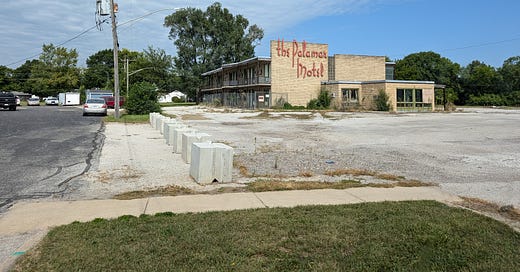“Hard Rain Falling,” by Don Carpenter, was such an emotionally taxing and exhilarating reading experience that I didn’t want to read another novel when I was done for fear of disappointment, even though the next books I’d planned to read were the last published by my favorite author.
The New York Review of Books republished this in 2009, after the author had been dead 15 years, and the book’s first printing was 30 years before that. I don’t understand why it seems to be enjoying recent (online) revival and who can say why art resonates, or doesn’t, in the life of its creator. (I found it doomscrolling Instagram and the tone of the short video was one of revelation; maybe it’s been known as this great work all along and I’m betraying my lack of literary education but the book’s introduction, written by George Pelecanos, touches on this.)
Finding surprise connections between books is one of the joys of reading. (One of the few things Cormac McCarthy said about writing, in 1992: "The ugly fact is books are made out of books. The novel depends for its life on the novels that have been written.") This book predates almost all the books by authors I’ve been drawn to over the last couple years and maybe they’re just swimming in the same waters or maybe this work influenced them in some way. I don’t know.
I still have a personal and professional desire to understand why, and how, and to still see the ways we’re common, to understand how shared experiences seldom talked about feel. Unsparing, but not unkind. I lose interest when the moral voice is too strong.
If you read the book: there are spoilers in the intro. I stopped after the first excerpt once I realized there might be and you can read up to the first without getting ahead of things.
“Jack nodded and drank some of his beer. He did not add that he had also bucked logs, worked in a cannery and a furniture factory, robbed gas stations, rolled drunks, and lived in half a hundred arid furnished rooms, pretended the vacuum was freedom, wakened almost daily to the fear that time was a dry wind brushing away his youth and his strength, and slept through as many nightmares as there were nights to dream. He just sat and smiled at Denny and saw what time had done to him and wondered, now comfortably, why he was so bothered by time. It happens to everybody this way, he thought, we sit here and get older and die and nothing happens.”
Some time between 2012 and 2014 a friend gave me “Reflections: Young Men in Back of the Yards Look at Their Lives.” It’s a short, small, black-and-white collection of photos and transcribed conversations and monologues from a weekly group meeting in the neighborhood, edited by Gregory Michie, who taught there, and the photos taken by Antonio Perez, a Chicago Tribune photographer.
I set the book on a shelf and forgot about it. Sometimes I’d remember but I never felt like it was the right time. One day, after I’d had the book for years, I realized I knew the book’s editor and photographer. I didn’t when I got the book, then after a few years of covering violence, I did.
We’d been to the school where Michie taught because a student was killed. Classmates had written remembrances and tacked them to a board in an upstairs hallway. We kept our mouths shut and watched. I cried after, alone, because it made me sad. The whole endeavor. And I have a difficult time talking about it without being emotional. Michie was there. We didn’t speak then. He was the boy’s homeroom and language arts teacher. He had this look in his eyes and face, something happened that couldn’t be set right and there was years of freight there, and he moved in that space with a certainty of purpose and projected calm and warmth, maybe without trying. Just a quiet, sure presence in a quiet moment. (You can read about some of his work here.)
For the last few years the book sat among the Chicago and violence books I’ve been putting off. I read it after “Hard Rain Falling,” in a couple hours Saturday afternoon in the laundromat. It’s difficult not to think of our specific type of violence as forever, in our lifetimes at least. The book was a reminder that few ideas in the anti-violence space are new, the issues kids are facing today have been there for decades or longer, and the solutions too, as much as anything can be “solved.” It’s just … there.
As relevant now as it was 25 years ago:
“So when guys like Benji finally do join a gang, it’s not always so much a choice as a surrender – an acknowledgment that, in their eyes, there are no better choices left.”
And what’s forever, anyway?
“That's one of the great secrets and pieces of perspective that the long view gives us and that's that the current ethnicities as we identify them are temporary things, long-term things from our short-term way of looking at it. I mean if I'm going to live to be 90 years old, ethnicity seems pretty set in stone to me. If I'm gonna live to be 200,000 years old, every ethnicity I see is a passing fad.”
Reading/Listening:
Tchaikovsky’s Suicide Note?
Going:
maybe
Listening:
Taffy Brodesser-Akner
Bach: Art of the Fugue
Episode 25: The Long View
Reading:
Shelter
Hard Rain Falling
Reflections: Young Men in Back of the Yards Look at Their Lives
The Passenger (“… having read even a few dozen books in common is a force more binding than blood.”)



Man, do I enjoy these posts! Your writing, and reflection on the writing of others, is a real treat. Still waiting on that Great American Novel. 😉